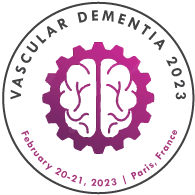Call for Abstract
Scientific Program
15th International Conference on Vascular Dementia, will be organized around the theme “Tackling Dementia with Technology”
Vascular Dementia 2023 is comprised of keynote and speakers sessions on latest cutting edge research designed to offer comprehensive global discussions that address current issues in Vascular Dementia 2023
Submit your abstract to any of the mentioned tracks.
Register now for the conference by choosing an appropriate package suitable to you.

